The new F30 BMW 3 Series is bigger, faster and better looking than the old E90, but is it better? We head to a wet and windy Taupo for the New Zealand launch to find out.
What is it?
The Ultimate Driving Machine again, apparently. The “Joy” line has been quietly dropped from BMW’s marketing for the new 3 Series and the good ol’ faithful Ultimate Driving Machine tag has been revived. And really, they couldn’t have picked a better time to do, because the new 3 Series seems to sum up that particular slogan very well indeed.
The new F30 3 Series takes cues from its larger 5 Series and 7 Series siblings in its latest incarnation and, as such, boasts styling that emphasises width over anything else. As a result, the new 3 Series looks, well, mean…
From the double kidney grille (which is looking anything but kidney-shaped these days) that now stretches out to meet the wider, more aggressive headlights to the flanks that now boast two lines running down the side of the car, everything about the design of the new 3 Series makes it look lower and wider than the previous model. Despite the fact it is actually bigger in all dimensions.
Growing 93mm in length, 50mm in wheelbase, 9mm in height and 37mm in width, the F30 represents a significant size increase over the E90. This increase in size also comes with an increase in standard specification, improved acceleration times for all models and, despite all this, better fuel economy and lower fuel consumption.
The F30 will initially be available with a choice of 4 engines, all hooked up to BMW’s 8-speed automatic transmission as standard. The 320d receives a carried-over version of the N47 2-litre, four-cylinder turbo diesel engine that pumps out the same 135kW of power and 380Nm of torque as the old model, but with an improvement in fuel economy of 16 percent, down to just 4.4L/100km.
It is a similar story in the 335i, which also receives a carried-over version the awesome N55 3-litre turbo inline six. WIth an impressive 225kW and 400Nm, the 335i also sees a drop in fuel consumption to 7.2L/100km.
The 320i and 328i get the newest engine in BMW’s range – a 2-litre twin scroll turbo petrol four-cylinder – in two different states of tune. The 135kW/270Nm 320i scampers to 100km/h in 7.6 seconds and has a claimed average fuel consumption of just 6.2L/100km.
The 328i’s version of the 2-litre petrol pumps out 180kW and 350Nm, shaves 1.5 seconds off the 320i’s 0 to 100 time, while returning an almost identical fuel consumption of just 6.3L/100km.
While the 320d and 335i’s engines are unchanged from the previous model, improvements in fuel economy and emission outputs are largely down to the fact that the all models now get BMW’s 8-speed automatic transmission, as well as a full compliment of the company’s EfficientDynamics systems like regenerative braking and auto stop/start.
Following on from the recently-launched new 1 Series, the new 3 Series sees the introduction of the BMW “Lines” trim/equipment packs. Available in Sport, Modern and Luxury, each “line” adds a different interior treatment, wheels and exterior highlights to the basic model. Available for $3,000 on top of the 320i and 320d base price and $2,000 on top of the 328i and 335i, there are no-cost choices within each line, such as leather and trim colours.
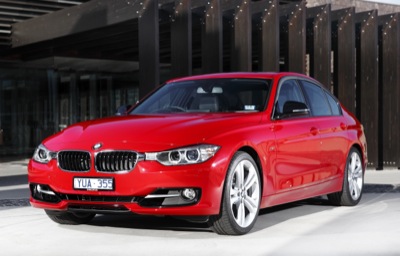
What’s it like?
In short, the decision to re-introduce the Ultimate Driving Machine tag was very appropriate because the F30 is very much a driving machine. And quite possibly the Ultimate one, at least in terms of luxury sedans.
The 335i is as ballistic as ever, with an utterly addictive exhaust bellow and a snarling, rasping engine note. The power simply pours on through the rear wheels at any speed and the linear acceleration is simply awesome.
The 320d is a brilliant as a BMW diesel ever is. A bit slower off the mark that the others, once the 320d is up and running it is incredibly impressive, surfing the fat wave of torque in a more relaxed manner that the angry 335i.
But the 328i is a revelation. Boasting more power and torque that the 6-cylinder E90 325i it replaces, the 4-cylinder turbo engine is strong and responsive and even boasts an impressive snarl under acceleration. You would be hard pressed to pick that it isn’t a 6-cylinder under acceleration, such is the strong way the power comes on, with virtually nothing in the way of turbo lag.
The 320i wasn’t available at the launch, but will be arriving shortly.
The launch of the F30 featured an afternoon thrashing them around a very wet Taupo race track. The Weather Gods didn’t seem to want us to get there and the plane into Taupo had to have a couple of goes at landing, but it was worth it, because here the 3 Series was utterly wonderful, as you would have every right to expect a powerful rear-wheel drive car with a perfect 50/50 weight distribution to be…
The track was very slippery, but all models remained remarkably composed, even under extreme provocation. With their massive torque, the 335i and 320d were the most fun, but all models were extremely impressive in the wet conditions, remaining predictable and controllable even bouncing and sliding over the slippery painted curbs, with the stability control coming in for particular praise in these conditions.
The following day on dry public roads was equally impressive, with ride quality in particular being a noticeable improvement over the E90. While handling is possibly even better, ride quality has been massively improved and, as a result, makes the 3 Series an even more complete package than it was before, as an E90 with big wheels and sports suspension could be quite an unpleasant prospect on some New Zealand back roads.
What’s good about it?
Most of it, to be honest. Handling and looks are particular highlights, while the fact that prices have come down while spec levels have increased is truly impressive.
The 8-speed transmission is a thoroughly wonderful piece of kit, being both incredibly fast and super-smooth in its operation.
Picking out a single aspect of the 3 Series as a highlight is slightly spurious however, as the entire package is just so complete and every aspect so complimentary of every other aspect, that it simply works, regardless of engine or spec level.
What’s not so good?
Some of the trim and colours in the Lines options are truly horrific, but then you have always been able to do horrible things to the interior of you BMW if you really wanted to.
Some places in the interior don’t feel quite up to the hugely high standards of previous BMW interiors, which can be highlighted by making the wrong interior trim choices, but sticking with the Sport line and down-playing the colours is your best bet.
There was the odd rattle present in some of the cars on the launch and the wind noise around the mirrors and a-pillars was noticeable, although certainly not terrible. Basically you are reduced to nit-picking the small things at this stage…
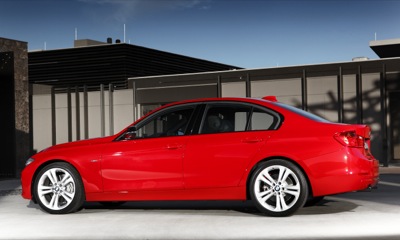
First impressions?
BMW have taken the 3 Series and pretty much made everything better. Plain and simple really.
Strong, frugal engines, great styling, more room, more kit and lower prices all conspire to make the F30 3 Series a truly impressive package. The spectacular handling and fantastic chassis electronics just take things over the top.
The improved ride will widen the appeal of the F30, while still retaining the core characteristics of BMW’s sporty DNA and the increase of standard equipment for less money simply strengthens this wider appeal.
In short, after a few hours on the track and a day on the road, it’s certainly looking like the Ultimate Driving Machine tag has never been more appropriate to throw at a mainstream BMW.
Specifications
Models/Prices
320i (auto) – $74,300
320d (auto) – $74,700
328i (auto) – $85,900
335i (auto) – $106,900
Manual transmissions available for $4,100 less
Powertrain
2.0-litre four-cylinder petrol producing 135kW/270Nm (320i), 2.0-litre four-cylinder diesel producing 135kW/300Nm (320d), 2.0-litre four-cylinder petrol producing 180kW/350Nm (328i) or 3.0-litre six-cylinder petrol producing 225kW/400Nm (335i); 8-speed automatic transmission; rear-wheel drive
Fuel consumption: 6.1L/100km (320i), 4.4L/100km (320d), 6.3L/100km (328i), 7.2L/100km (335i)
CO2 emissions: 144g/km (320i), 117g/km (320d), 147g/km (328i), 169g/km (335i)
Safety
ANCAP/EuroNCAP rating: Not tested yet
Air bags: 6
Stability control: Yes
Lap/diagonal belts: 5

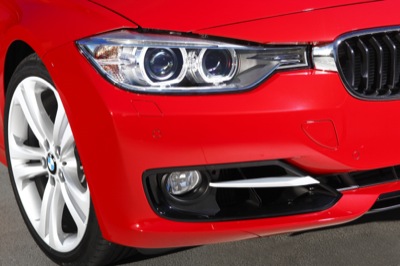
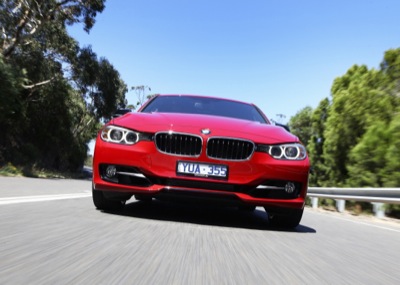
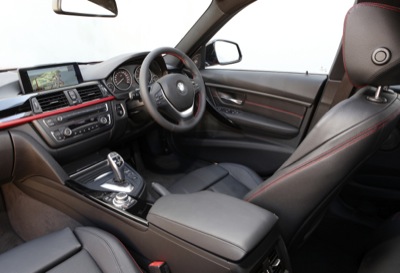
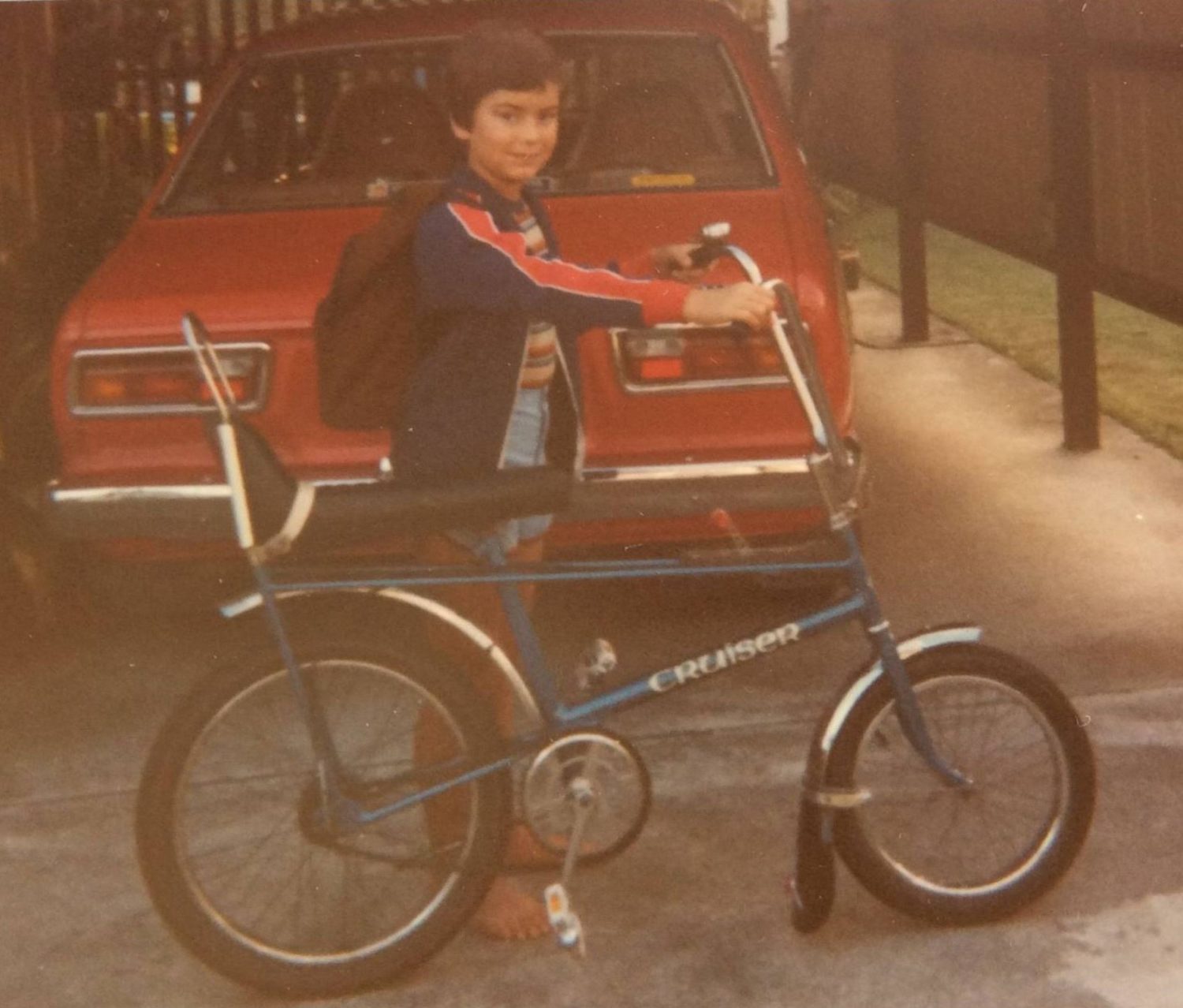
You must be logged in to post a comment.